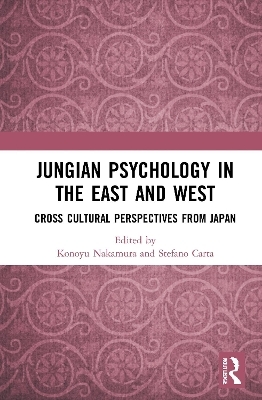
Jungian Psychology in the East and West
Routledge (Verlag)
978-0-367-76689-4 (ISBN)
It is well known that Jung’s investigation of Eastern religions and cultures supplied him with an abundance of cross-cultural comparative material, useful to support his hypotheses of the existence of archetypes, the collective unconscious and other manifestations of psychic reality. However, the specific literature dealing with this aspect has previously been quite scarce. This unique edited collection brings together contributors writing on a range of topics that represent an introduction to the differences between Eastern and Western approaches to Jungian psychology.
Readers will discover that one interesting feature of this book is the realization of how much Western Jungians are implicitly or explicitly inspired by Eastern traditions – including Japanese – and, at the same time, how Jungian psychology – the product of a Western author – has been widely accepted and developed by Japanese scholars and clinicians.
Scholars and students of Jungian studies will find many new ideas, theories and practices gravitating around Jungian psychology, generated by the encounter between East and West. Another feature that will be appealing to many readers is that this book may represent an introduction to Japanese philosophy and clinical techniques related to Jungian psychology.
Konoyu Nakamura is Professor of Clinical Psychology at Otemon Gakuin University in Osaka, Japan. She is involved in clinical work at her private practice in Kyoto as a Jungian-oriented psychotherapist. She has contributed chapters to several books, including Analytical Psychology in a Changing World: The Search for Self, Identity and Community (2015) and Jungian Perspective on Rebirth and Renewal Phoenix Rising (2017). She was responsible for translating Susan Rowland’s Jung: A Feminist Revision into Japanese (2021). She is a member of the International Association for Jungian Studies and is a member of the Executive of Committee of the International Association for Jungian Studies for the 2015–2020 term and she was also Co-Chair of the 2019 IAJS Regional Conference, Osaka, Japan, at Otemon Gakuin University. Stefano Carta is a psychologist and a Jungian analyst graduate at the C.G. Jung Institute in Zurich. He is Professor of Dynamic and Clinical Psychology at the University of Cagliari, Italy, and Honorary Professor at the Department of Psychoanalytic Studies at the University of Essex, UK. He is a member of the International Association of Analytical Psychology, and of the Associazione Italiana di Psicologia Analitica (AIPA), of which he was the President for the 2002-2006 term. He has been the representative for Italy at the United Nations’ International Union of Psychological Sciences. He has also been a consultant for UNESCO, for which he has edited a three-volume entry on psychology for the Encyclopedia of Life Support Systems. He is the the director of the oldest Jungian Journal in Italy, The Rivista di Psicologia Analitica, and has been the deputy Europe editor of the Journal of Analytical Psychology.
Part 1: East and West 1. How Can We Survive in This Globalized Age? Exploring ego consciousness in the Western and the Japanese psyches 2. The Ego and Self in East-West Psychology 3. Cultural Reflection in Eastern and Western Tales of the Mirror 4. East Meets West in World War II: Implications for Japan’s Maternal Culture Part 2: Images 5. Narcissism and Difference: Narcissism of Minor Differences Revisited 6. Encountering the other world in Japanese Manga: from Hyakki-yagyo-zu to Pocket Monsters 7. Ancient Chinese Hieroglyph: Archetype of Transformation of Jungian Psychology and Its Clinical Implication 8. Conversion of Saint Francis of Assisi: Guidance by Dreams and Encounter with Father Part 3: Clinical Issues 9. Intimate relationships between women and men: psychosocial and post-Jungian perspectives 10. Rising Compassion. Revisiting ‘clinical empathy’ from F. Schleiermacher’s translational viewpoint 11. Ensou and Tree view therapy: Zen based psychotherapy from Hisamatsu and Kato theory 12. Significance of drawings without a tree in response to the Baum test by schizophrenic patients: Interpreting drawings by schizophrenic patients from a Jungian perspective Part 4: Identity and Individuation 13. The House Imago and the Creation of Order 14. From Dragons to Leaders: Latvian and Japanese Psyches, and an Organic Consciousness 15. Emptiness and Diversity -psychological inner movement in western and eastern culture- 16. Un-written in Stone: Re-Imagining Individuation and the Objective Psyche with Japanese and American Landscapes 17. More Ancient Layers of the Japanese Psyche as Seen from the Tales and Dreams of the Ainu 18. Makoto Tsumori’s philosophy of care and education in relation to Jungian psychology.
| Erscheinungsdatum | 02.08.2021 |
|---|---|
| Zusatzinfo | 2 Line drawings, black and white; 31 Halftones, black and white; 33 Illustrations, black and white |
| Verlagsort | London |
| Sprache | englisch |
| Maße | 156 x 234 mm |
| Gewicht | 426 g |
| Themenwelt | Geisteswissenschaften ► Philosophie ► Geschichte der Philosophie |
| Geisteswissenschaften ► Philosophie ► Philosophie der Neuzeit | |
| Geisteswissenschaften ► Psychologie ► Psychoanalyse / Tiefenpsychologie | |
| ISBN-10 | 0-367-76689-2 / 0367766892 |
| ISBN-13 | 978-0-367-76689-4 / 9780367766894 |
| Zustand | Neuware |
| Haben Sie eine Frage zum Produkt? |
aus dem Bereich


